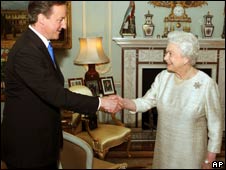New British Prime Minister 英国的新首相
收听与下载
Conservative David Cameron Wins 保守党的戴维·卡梅伦获胜
After days of political horse-trading the UK finally has a new government and a new Prime Minister, following the resignation of Labour's Gordon Brown on Tuesday evening.
Since last Thursday's general election resulted in a hung parliament, a situation in which none of the political parties has an overall majority, British politicians have been attempting to form a coalition government.
Such a government is comparatively rare in the UK. Indeed this is the first coalition since the Second World War.

The Queen invites the new PM to form a government
So how did it happen?
Last week's general election saw the public vote split amongst the political parties in such a way that no party achieved the 326 seats required to gain a majority and therefore form a government.
This situation is known as a hung parliament, and means that two or more of the opposing parties have to unite in order to have more than 326 seats between them.
The Conservative party won 306 seats while Labour and the Liberal Democrats got 258 and 57 seats respectively.
This meant that the Liberal Democrats effectively became 'kingmakers', with the power to choose which rival to form a coalition with.
Both Labour and the Conservatives attempted to woo the Lib Dems with various offers over the last few days, but in the end Gordon Brown resigned both as Prime Minister and as Labour leader, paving the way for the new government.
Many have seen the Lib Dems as the real winners in this situation, given the fact that their leader Nick Clegg has been appointed Deputy Prime Minister and four others have received ministerial appointments.
However, it remains to be seen how effectively David Cameron's Conservatives can work with their new partners.
Glossary 词汇表 (收听发音, 请单击英语单词)
- political horse-trading政治交易、讨价还价
- resignation 辞职
- Labour 工党
- general election大选
- hung parliament无党派占绝对多数的议会/悬空议会
- political parties 政党
- overall majority占绝大多数
- coalition government联合执政政府
- comparatively rare相对少见的
- public vote公众投票
- seats 议席
- unite 联合
- Liberal Democrats 自由民主党
- respectively 分别地
- kingmakers 拥立国王的人
- rival 对手
- woo 求得赞同、讨好
- paving the way铺平道路
- Deputy Prime Minister 副首相
- ministerial appointments部长级的任命